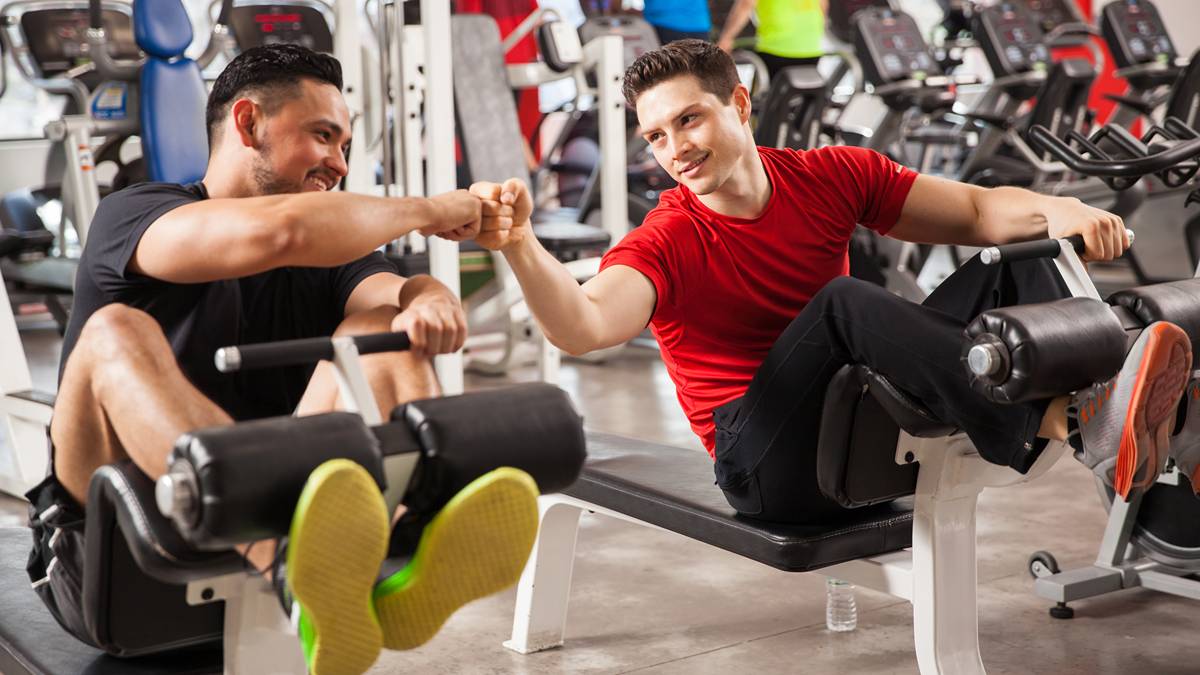Can I claim wellness expenses on tax? What the ATO says

"Bro, I'm making sick gains, not deductions." "Yeah, I feel you." (And so forth.) Pic via Getty Images
From massages to float tank sessions, here’s what the ATO won’t let you claim as a tax deduction – and the legit wellness expenses that might actually make the cut.
Words by Tianna Nadalin for bodyandsoul.com.au
Every July, accountants across the country brace for the same bizarre battle: Australians attempting to deduct all sorts of ‘wellness-related’ expenses on their tax returns – from facials and massages to boob jobs and gym memberships.
According to H&R Block director of tax communications Mark Chapman, there’s no shortage of creative (and questionable) wellness claims come tax time.
“Wellness is a fairly abstract concept,” Chapman says.
“We’ve seen people try to write off cosmetic surgery, facelifts, boob jobs – often claiming it’s essential for their work, especially in entertainment or appearance-driven industries.”
The Australian Taxation Office (ATO), however, isn’t buying it.
So before you try writing off your float tank sessions or your weekly lymphatic drainage massage, here’s what you need to know.
Why most wellness expenses aren’t tax deductible in Australia
The ATO takes a firm stance: If an expense is primarily for personal benefit, it’s not deductible.
That means most wellness expenses – even if they help you feel better, be more focused or look more polished at work – don’t make the cut.
That includes:
- Massages
- Acupuncture and alternative therapies
- Gym memberships
- Supplements
- Beauty products and treatments
- Medical procedures (including cosmetic surgery)
“Any incidental work-related benefit is just that – incidental,” Chapman explains.
“Even if someone argues their job performance improves from taking supplements or getting regular facials, the ATO will knock that back.”
Can you claim wellness expenses on tax in Australia?
Most wellness expenses – including massage, gym fees, supplements and cosmetic procedures – are considered private by the ATO and are not tax deductible.
The only exceptions are when they’re directly related to income-earning activities and supported by strong evidence.
“The most common one that people try to claim is gym memberships,” Chapman says.
“Gym memberships are strictly prohibited unless you have a job which (requires) an extraordinarily high level of fitness, like somebody in the special forces, the SAS, or a professional footballer.
“In that case, you can probably get away with the gym memberships, but otherwise absolutely not. The ATO just says no.”
Wellness expenses Australians have tried to claim
Beauty products
Claimed as ‘appearance maintenance’ for a receptionist role.
ATO decision: No, grooming = private expense.
Weekly massages
Filed under ‘stress management for demanding work’.
ATO decision: That’s a personal coping mechanism, not a deductible.
Gym memberships
Claimed as ‘essential’ for staying in shape by a personal trainer.
ATO decision: Unless you’re elite military or a professional athlete, gym costs are out.
Supplements and vitamins
Claimed to support ‘immune health and mental clarity’.
ATO decision: Unless prescribed and essential to your ability to do a specific job (and supported by medical documentation), forget it.
Cosmetic surgery
Filed as ‘career investment’ for someone working in entertainment.
ATO decision: If it doesn’t directly earn income, it’s not deductible.
Float tank sessions
Categorised under ‘mindfulness and focus improvement’.
ATO decision: Still a private wellness expense, not a work-related cost.
So what tax deductions can you actually claim?
It might feel like all the fun stuff is off-limits, but there are legitimate deductions worth remembering:
- Work-related training or self-education costs
- Home office expenses (actual costs, or fixed rate method of 67c per hour worked)
- Professional subscriptions or union fees
- Donations to registered charities (over $2, with a receipt)
- Tax agent fees from last year’s return
- Income protection insurance (if paid outside super)
Top mistake people make at tax time
“One of the most common mistakes people make is claiming something without proof it was genuinely work-related,” Chapman says.
“If you want to make the most of your return, keep records – invoices, receipts, even photos of them stored in a digital folder.”
Mark Chapman’s smart tax-time prep tips
#1. Track your receipts in real time
Receipts fade. As soon as you spend money on a work-related item, take a photo or scan the receipt and store it safely – ideally in a dedicated folder on your phone or computer.
#2. Organise now, not later
Go back through the year and make sure you’ve got proof for every work-related expense.
If something’s missing, try to get a copy from the retailer before June 30.
#3. Choose your method for working-from-home deductions
You can either keep every bill (electricity, internet, phone) for actual costs – or use the ATO’s simpler 67c-per-hour method, which just requires a timesheet or diary.
#4. Use a tax agent
While it might be tempting to see how far you can push a deduction, it’s not worth risking an audit.
“You might get away with a dodgy claim once, but if the ATO sees a pattern, you could end up under review,” Chapman warns. “That’s not a fun place to be.”
This article first appeared in bodyandsoul.com.au

UNLOCK INSIGHTS
Discover the untold stories of emerging ASX stocks.
Daily news and expert analysis, it's free to subscribe.
By proceeding, you confirm you understand that we handle personal information in accordance with our Privacy Policy.








